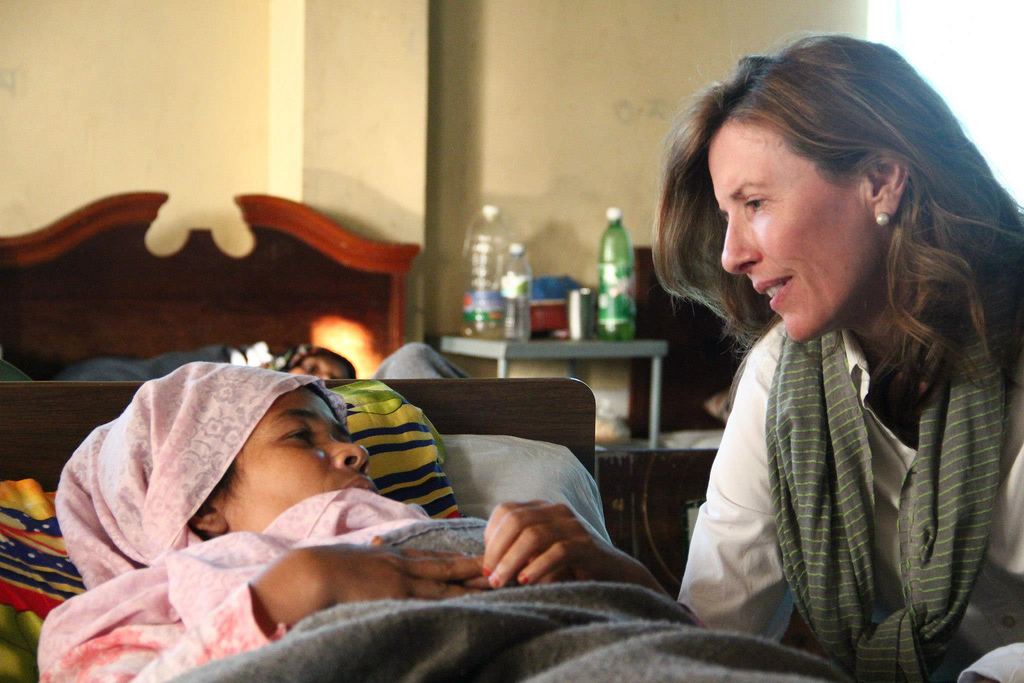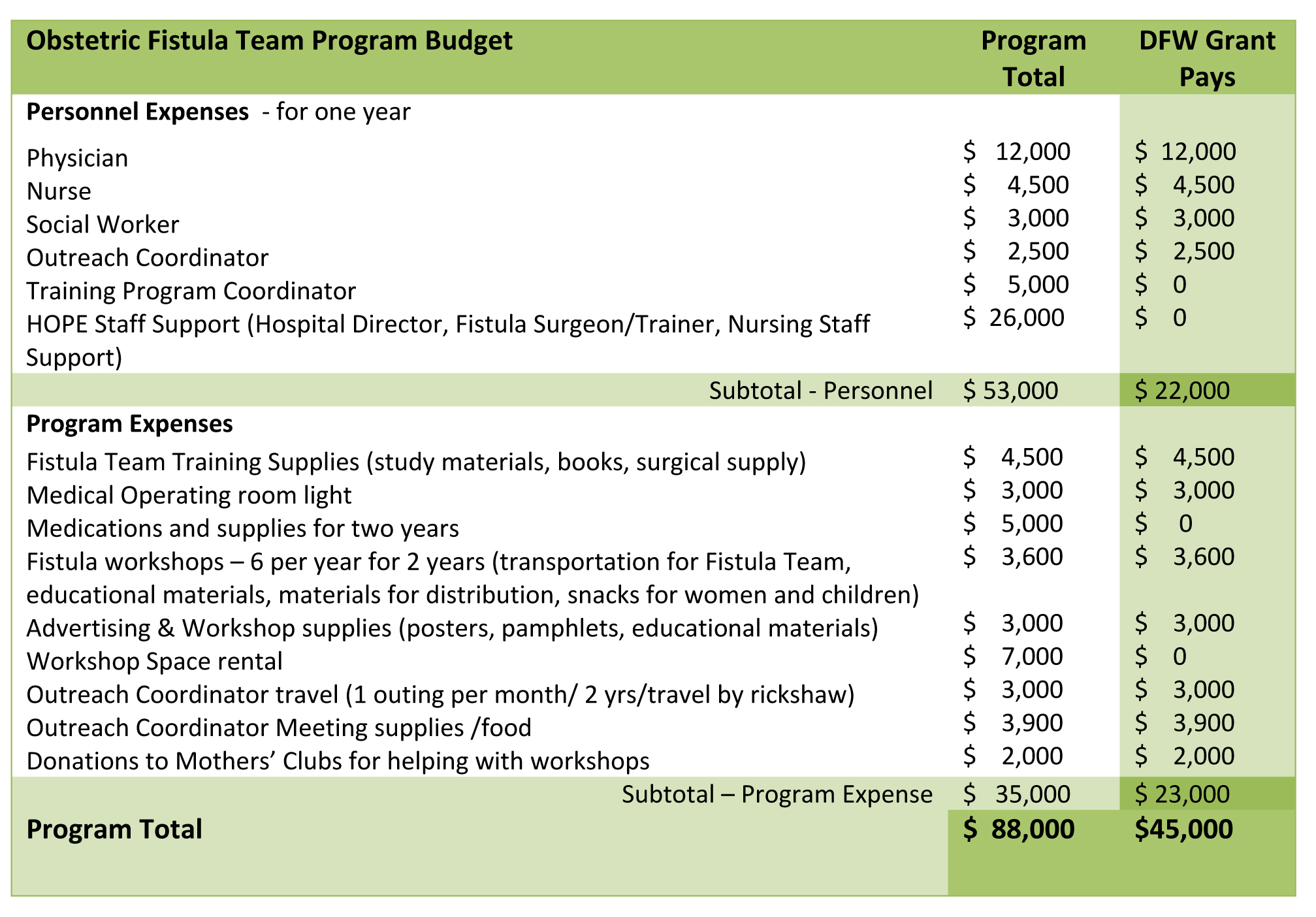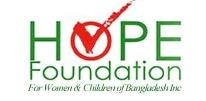
Mission
— Kofi Annan, former Secretary-General of the United Nations
The mission of HOPE Foundation is to provide health services to needy people in Bangladesh, particularly the women and children in rural areas.
The HOPE Foundation for Women and Children of Bangladesh, featured program for May, is the recipient of a $45,000 DFW grant, disbursed over two years, which will create a trained team to provide year-round treatment of obstetric fistula. The team will not only provide support to the International Federation of Gynecology and Obstetrics (FIGO) surgeon who has been provided by the Fistula Foundation to treat obstetric fistula, but also provide the means to run an awareness and prevention program in Cox’s Bazar, Bangladesh.
Obstetric fistula is a hole that develops between the rectum and vagina, and/or between the urinary tract and vagina of women during prolonged birth or obstructed labor where C-sections are not available. Without timely treatment obstructed labor results in the death of the child in the womb. A mother who develops fistula and receives no treatment suffers for the rest of her life from incessant incontinence of urine and/or feces. Her husband, her family and her community abandon her. She lives in shame and isolation with her foul odor and the social stigmatization that she is cursed. A trained outreach team is needed to help these women. Without a support team, the surgeon can reach and help only a small number of women, and outreach and preventive measures are almost impossible.
Life Challenges of the Women Served
— Bangladesh Internal Health Review (Download the full, 55-page report)
In the developed world, access to modern maternal and obstetric care makes obstetric fistula a rare occurrence. Fistulas exist mostly in undeveloped countries where women typically give birth at home with untrained assistance, where prenatal care is almost non-existent, where early marriage leads to pregnancy in young girls, where nutrition is poor and where women receive little education, particularly about their bodies or maternity and birth.
Over 90 percent of rural women in Bangladesh give birth at home with no trained medical personnel present. As a result, three women die every hour due to pregnancy and childbirth complications. The problems of rural home births are threefold:
- Untrained birth attendants are not likely to recognize or be able to treat high risk cases.
- Poor rural women traditionally do not have pre-natal care that might alert trained personnel to a potential problem.
- The women have little knowledge of their bodies, pregnancy or birth that would inform them of safer practices.
The Project
The Obstetric Fistula Team is a new addition to the Obstetric Fistula Program that operates in the HOPE Hospital in Cox’s Bazar. Fistula treatment is done at the hospital by skilled visiting surgeons who are paid for by the Fistula Foundation. The visiting fistula surgeons are not available year round. A total of 98 fistula surgeries have been performed at HOPE Hospital since the Fistula Program’s inception in 2011. The HOPE program realizes there are many more women with obstetric fistulas who need surgery and even more who are at risk. These women are not easily identified because they live in remote villages and do not seek care. The program objectives are to:
- Establish an Obstetric Fistula Team to provide fistula repair surgeries on a year-round basis.
- Select and train current hospital staff members to become specialists in obstetric fistula care and work exclusively with fistula patients.
- Implement an outreach campaign to build community awareness and prevention.
- Reduce the number of women who develop obstetric fistula.
- Increase the number of fistula surgeries performed yearly.
- Establish HOPE Hospital as a center of excellence for treating Obstetric Fistula.
The DFW grant will allow the program to build a trained team that can provide wider outreach into the community to target and address the needs of suffering and at risk women:
- Current fistula sufferers who don’t realize their condition is curable.
- Pregnant women who should be monitored throughout their pregnancy.
- Not yet pregnant women who can avoid or minimize birth risks through access to information on sexual and maternal health.
The trained Obstetric Fistula Team will support and extend the work of the fistula surgeon by traveling to villages to provide medical care, health and reproductive education, and to build awareness of the affordable care that HOPE can provide. Renowned urologist and fistula surgeon, Dr. Steven Arrowsmith, will train the team.
Through services and education, HOPE aims to transform the cycle of shame and stigmatization into a situation where women can identify the condition and are aware they can receive the surgery to reverse it. The Outreach Coordinator will use existing and new resources to pursue the team’s mission as they expand their reach into the community:
- Mothers’ Clubs – Created by HOPE in villages throughout the area, these clubs provide a safe place for women to talk openly about their sexual and reproductive health, which is socially taboo anywhere else in Bangladesh. Women in these clubs have already begun to identify untreated fistula sufferers and refer them to HOPE, and they will become increasingly important centers for identifying and referring pregnant women to the program.
- Outreach Coordinator – This new position created for the Obstetric Fistula Team is charged with addressing the root causes of obstetric fistula through the prevention campaign and awareness building. The Coordinator will travel to remote villages, connect with Mother’ Clubs and work to locate more surgery candidates as well as run educational workshops on healthy delivery. The Coordinator will meet with local birth attendants, medicine shopkeepers and unlicensed doctors to educate them on identifying and preventing fistula and to identify untreated fistula sufferers. Transportation and surgeries will be arranged at low or no cost.
- HOPE Medical Centers – Through other funding, these remote care centers will be equipped to provide more accessible delivery centers to assist in normal and emergency delivery. Women will be more likely to seek assistance in a birth crisis or with normal deliveries with trained birth attendants at closer.
- Fistula Survivors – Women who have had reparative fistula surgery are encouraged and trained to become local representatives for the HOPE program. Those who show interest and success as local representatives will be trained to become part of the Obstetric Fistula Team when openings come up.
Questions for Discussion
- Obstetric fistula is a widespread problem among the poor of Bangladesh. What are the issues that perpetuate the problem?
- What are the elements of the Obstetric Fistula Team’s approach that are likely to make it successful?
- How does the program’s approach of education and assistance help them to cause women to choose prenatal care and delivery with a trained midwife over a traditional birth attendant?
How the Grant Will be Used
DFW’s grant of $45,000 will directly impact the members of the Obstetric Fistula Team and 100 women receiving fistula surgery annually. Indirectly, over 1,000 women and girls per year will be impacted through the outreach workshops, meetings, and trainings.
Why We Love This Project/Organization
We love this program because it’s possible to restore women’s lives and their relationship to the community in such a way that they may become advocates and sources of information, as well as role models for others. The awareness and prevention outreach program helps to educate women and birth attendants about potential birth complications and their prevention, and helps locate women who would benefit from fistula repair surgery. It brings hope and new life to many ostracized and abandoned women.
Evidence of Success
HOPE measures the success of its fistula program by comparing the average number of fistula surgeries performed annually (32) with the average number performed by the four other fistula hospitals across all of Bangladesh (22). They aim to increase the average number through fistula camps and year round service through the outreach medical centers. The success of the outreach program will be measured by an increase in the number of women found who are in need of surgery, the number of women who receive sexual and reproductive health information at Mothers’ Clubs and HOPE workshops, and lastly, by the growth of the organization in the number of fistula survivors who become representatives for HOPE in the fight against obstetric fistula and the number of staff recruited to join the team.
Voices of the Girls
The voices of the women provide a more personal measure of the critical need for the program as they describe their painful experiences:
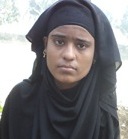 “I want to get my normal life back. How long can my father shoulder my responsibility?”
“I want to get my normal life back. How long can my father shoulder my responsibility?”During Johora Begum’s first delivery at the age of 17, the traditional attendant told her that her delivery was normal but her situation worsened over the next two days. She was taken to two different hospitals. The child was stillborn at the first hospital. Other complications developed and she became paralyzed from her waist down. She was treated at the second hospital where the paralysis was cured, but she developed a constant numbness that she suffers to this day. It has been one year since that delivery, and she has been suffering from incontinence.
Sufiya Begam has been suffering from obstetric fistula for the last 15 years since the delivery of her fifth baby with the assistance of a traditional birth attendant during which the fistula occurred. Her husband left her many years ago. Relatives and neighbors disgrace her, and she lives a lonely life. During her interview for the fistula program, she was sobbing.
About the Organization
Dr. Iftikher Mahmood founded HOPE Foundation for Women and Children of Bangladesh in 1999. Dr. Mahmood is a native of Cox’s Bazar, who immigrated to the US to continue his education in pediatric medicine. While visiting Bangladesh in 1999, he decided to build a charitable hospital in his hometown to provide medical care to the most neglected people in the community. He established the HOPE Foundation for Women & Children in Bangladesh in the US as a charitable organization whose mission is to provide healthcare to the poor and needy mothers and children in Bangladesh. Through tireless fundraising, HOPE’s team raised enough money to build a 40-bed hospital in Ramu, Cox’s Bazar, as well as eight HOPE Medical Centers in rural areas.
Through HOPE Hospital and the HOPE Medical Centers, over 30,000 women and children a year are being reached. In addition to maternal, child and primary health care, HOPE Foundation also provides specialized care through their international partners in the health areas of obstetric fistula, burns, cleft lip/cleft palate, and trauma.
Where They Work
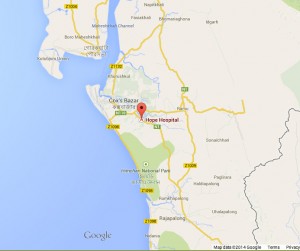
Cox’s Bazar is a sub-district of Chittagong division in southeast Bangladesh between Myanmar and the Bay of Bengal. The sea town of Cox’s Bazar attracts many tourists with its miles of beautiful, sandy beaches. As in many tourist areas of the developing world, Cox’s Bazar has a large poor population that does not benefit from tourist dollars.
HOPE hospital is a 40-bed hospital located in the outskirts of the town of Ramu (about a 30-minute bus ride from the city) that sees over 25,000 patients a year. It serves the impoverished in the area and, in addition to regular primary healthcare, provides specialized care through its partnership with many reputable international organizations.
HOPE’s eight Medical Centers are small health clinics set up in rural villages, increasing access to healthcare in hard to reach areas. Most patients are overwhelmingly disadvantaged, and transportation to HOPE Hospital can be difficult or completely impossible. Through these clinics, HOPE is able to serve even the most rural of areas. HOPE Medical Centers also serve as referral centers if a patient requires advanced treatment at HOPE Hospital.

